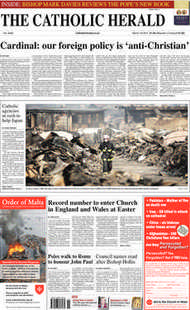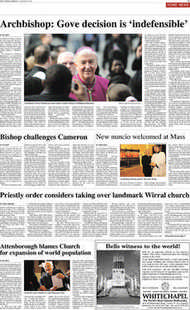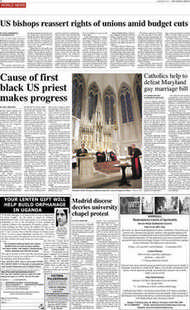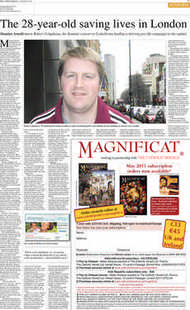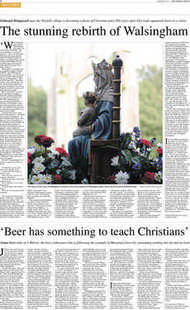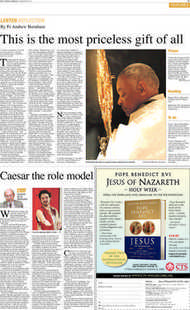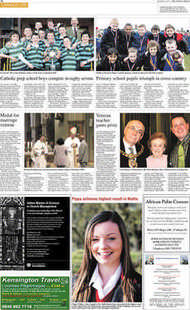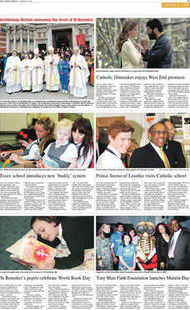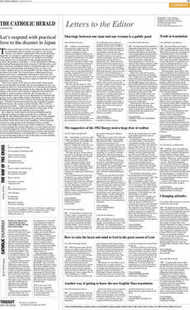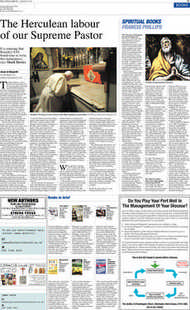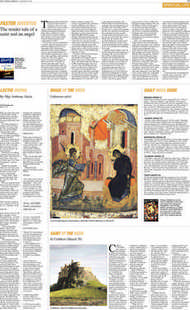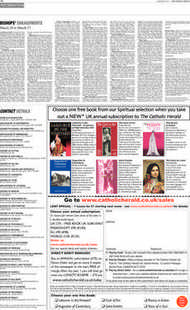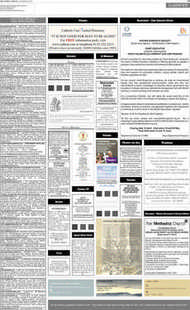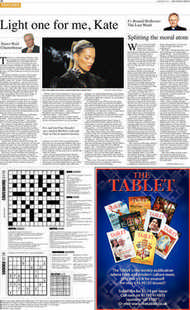Page 15, 18th March 2011
Page 15

Report an error
Noticed an error on this page?If you've noticed an error in this article please click here to report it.
Tags
Share
Related articles
The Good, The Bad And The Morally Ambivalent
Meat And Miniskirts
Decent, Clean And Honest
A Quick Look At 18 Books
SPIRITUAL BOOKS FRANCIS PHILLIPS
The Journey of the Popes by Gerard Noel, £15 The story of the men who have held this awesome office in the Church throughout the ages always makes a fascinating study: saints, scholars and sometimes florid sinners, they reflect in memorable fashion the human side of a divine institution. Gerard Noel, former editor of The Catholic Herald, subtitles his study “A papal curiosity shop” and this is what it is: a rummage round the singular personalities who have graced – or disgraced – their position.
In his introduction Noel concludes that “reflection on their lives inspires reflection on our lives. Such reflection may aid enlightenment.” I am not entirely sure that this is the case. Generally speaking, apart from St Peter himself and the popes of the 20th century who remain in living memory and some of whom are being considered as candidates for canonisation, these men’s lives are too remote or too exotic to speak to our lives; such enlightenment as may be garnered is the sober reflection that the gates of hell will not prevail against the Church, whatever her most prominent members may do to undermine her.
The chapter titles give some indication of Noel’s selection process: “The adulterous and brutal pope”; “The pope who was guilty of heresy”; “The pope who went mad.” To be fair, he also describes (a few) great and holy men: “The pope who saved the Church from being destroyed” or “A notable reform pope”.
A drawback of this interesting anthology is the lack of any reference books or bibliography to support authorial statements, such as: “The notion that priests can’t be married and women can’t be priests would have been greeted with guffaws of laughter by Peter who, of course, was married himself. In his time, priests were allowed to be married and women were allowed to be priests.” Noel also includes the story of “Pope Joan”, although agreeing that this is a legend without any historical basis; indeed, accepting that the “legend was demolished by a French Protestant, David Blondel [who] did what a good historian should: he looked at the timeline and was unable to find a gap where Joan could have reigned.” In one of his Barsetshire novels the incomparable Trollope mentions “the romantic tale of the woman Pope”; in reality it was a degrading piece of Protestant propaganda.
Writing of the late John Paul II Noel comments: “A great many Catholics were alienated by the maintenance of traditional positions on contraception, abortion, marriage, homosexuality, clerical celibacy and female ordination” which left me wondering what a “progressive” Catholic view on abortion and marriage would look like. The author is also critical of Pope Benedict XVI: “His efforts to encourage greater interest by Anglicans in the Roman Church have so far been marred by a failure to amend the Roman claim that Anglican orders are ‘null and void’.” What a pity that Noel should neglect to mention the generous provisions of the ordinariate.
To order The Journey of the Popes please send a cheque for £15 payable to “Gerard Noel” to the following address: The Journey of the Popes book offer, 43 Caterham Drive, Old Coulsdon, Surrey CR5 1JP.
The Elusive Father Brown by Julia Smith, Gracewing £12.99 The author has done her own sleuth work here, discovering the man behind G K Chesterton’s famous detective. He was, as is well-known, Mgr John O’Connor, and one of those priestly eccentrics who were not uncommon in the Church in the early part of the 20th century. Born in Clonmel in 1870 into a devout Irish family, he was sent to school in Douai, Belgium, to complete his education.
Ordained a priest in Rome in 1895 he was then sent to the Leeds diocese where he spent the rest of his life. His first parish was in Heckmondwike, where he spent 14 years.
He met GKC on December 3 1903, in Keighley, and they immediately struck up a friendship, walking over the moors together to Ilkley on the 4th. Fr O’Connor loved music, good company and conversation. He also loved art and was also an avid art collector all his life; he had a good eye for the genuine article and amassed a valuable art collection from modest sale-room purchases. This keen eye habitually noted small things missed by others; perhaps it was this instinct for the unobserved and insignificant detail that worked its power on GKC’s imagination. As well as his convivial pursuits Fr O’Connor visited the workhouse and local prison regularly; the author writes: “All life was here in these mean streets, peopled by characters with whom Dickens would have felt familiar.” GKC, who wrote a justly celebrated book about Dickens, would have found much to discuss with the urbane and cultured monsignor.
blog comments powered by Disqus


